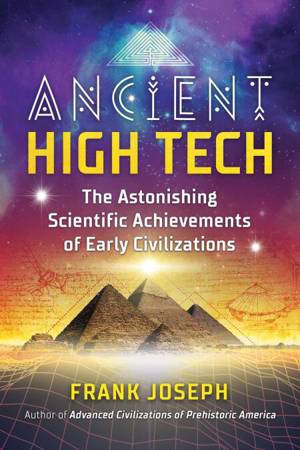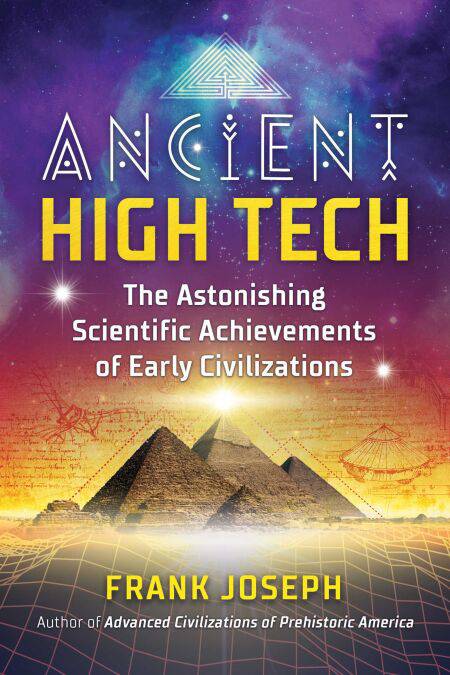
- Retrait gratuit dans votre magasin Club
- 7.000.000 titres dans notre catalogue
- Payer en toute sécurité
- Toujours un magasin près de chez vous
- Retrait gratuit dans votre magasin Club
- 7.000.0000 titres dans notre catalogue
- Payer en toute sécurité
- Toujours un magasin près de chez vous
Ancient High Tech EBOOK
The Astonishing Scientific Achievements of Early Civilizations
Frank Joseph
Ebook | Anglais
15,65 €
+ 15 points
Description
A detailed look into ancient advanced technology, science, and medicine--some of which has yet to be reproduced today
• Explores countless examples of ancient high tech, including robotics, artificial intelligence, aircraft, solar-powered cannons, high-speed drills, illuminated underground temples, massive refrigerators, and subterranean cities
• Examines evidence of advanced medicine in ancient times
• Includes examples from ancient Egypt, China, Greece, Babylon, Siberia, the Americas, and India
The first self-igniting match was invented in 1805 by Jean Chancel, a French chemist. Yet, in Babylon, 3,600 years before, identical sulfur matches were in common use. On the Panchavarnaswamy Temple in India, built millennia ago, there is a detailed carving of a man on a bicycle, yet the bicycle wasn’t invented in the modern world until 1817. These inventions are only two examples of technology lost in the Dark Ages.
Exploring the sophisticated tech achieved by ancient civilizations hundreds and thousands of years ago, Frank Joseph examines evidence of robotics and other forms of artificial intelligence; manned flight, such as hot-air balloons and gliders; and military science, including flamethrowers, biological warfare, poison gas, and solar-powered cannons. He reveals how ancient construction engineers excavated subterranean cities, turned stone walls into glass, lifted 100-ton blocks of granite, illuminated underground temples and pyramids, and stored their food in massive refrigerators.
Examples explored in the book include the first known alarm clock, invented by Plato in 4th-century-BC Greece; 600-year-old Aztec whistles that reproduce animal sounds and human voices with uncanny accuracy; Stone Age jewelry from Siberia worked by a high-speed drill; sex robots in ancient Troy, Greece, and China; ancient Egyptian aircraft; and India’s iron pillar exposed to sixteen hundred years of monsoons but still standing rust-free. The author also explores evidence of advanced medicine in ancient times, particularly in Egypt and China, from brain surgery, optometry, and prosthetics to dentistry, magnet therapy, and cancer cures.
By examining the achievements of our ancient ancestors, we can not only reverse-engineer their inventions but also learn from their civilizations’ mistakes, enabling us to avoid more dark ages. Imagine how scientifically advanced humanity would be if our early achievements had escaped destruction and been allowed to develop?
• Explores countless examples of ancient high tech, including robotics, artificial intelligence, aircraft, solar-powered cannons, high-speed drills, illuminated underground temples, massive refrigerators, and subterranean cities
• Examines evidence of advanced medicine in ancient times
• Includes examples from ancient Egypt, China, Greece, Babylon, Siberia, the Americas, and India
The first self-igniting match was invented in 1805 by Jean Chancel, a French chemist. Yet, in Babylon, 3,600 years before, identical sulfur matches were in common use. On the Panchavarnaswamy Temple in India, built millennia ago, there is a detailed carving of a man on a bicycle, yet the bicycle wasn’t invented in the modern world until 1817. These inventions are only two examples of technology lost in the Dark Ages.
Exploring the sophisticated tech achieved by ancient civilizations hundreds and thousands of years ago, Frank Joseph examines evidence of robotics and other forms of artificial intelligence; manned flight, such as hot-air balloons and gliders; and military science, including flamethrowers, biological warfare, poison gas, and solar-powered cannons. He reveals how ancient construction engineers excavated subterranean cities, turned stone walls into glass, lifted 100-ton blocks of granite, illuminated underground temples and pyramids, and stored their food in massive refrigerators.
Examples explored in the book include the first known alarm clock, invented by Plato in 4th-century-BC Greece; 600-year-old Aztec whistles that reproduce animal sounds and human voices with uncanny accuracy; Stone Age jewelry from Siberia worked by a high-speed drill; sex robots in ancient Troy, Greece, and China; ancient Egyptian aircraft; and India’s iron pillar exposed to sixteen hundred years of monsoons but still standing rust-free. The author also explores evidence of advanced medicine in ancient times, particularly in Egypt and China, from brain surgery, optometry, and prosthetics to dentistry, magnet therapy, and cancer cures.
By examining the achievements of our ancient ancestors, we can not only reverse-engineer their inventions but also learn from their civilizations’ mistakes, enabling us to avoid more dark ages. Imagine how scientifically advanced humanity would be if our early achievements had escaped destruction and been allowed to develop?
Spécifications
Parties prenantes
- Auteur(s) :
- Editeur:
Contenu
- Nombre de pages :
- 336
- Langue:
- Anglais
Caractéristiques
- EAN:
- 9781591433835
- Date de parution :
- 03-08-20
- Format:
- Ebook
- Protection digitale:
- Adobe DRM
- Format numérique:
- ePub

Les avis
Nous publions uniquement les avis qui respectent les conditions requises. Consultez nos conditions pour les avis.






